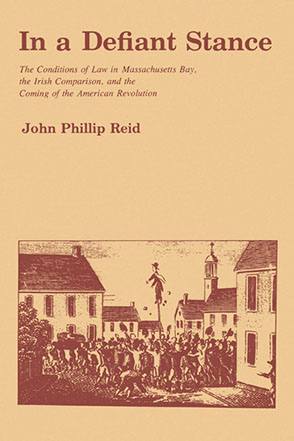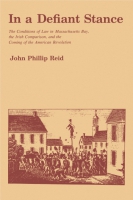
In a Defiant Stance
The Conditions of Law in Massachusetts Bay, the Irish Comparison, and the Coming of the American Revolution
John P. Reid
In a Defiant Stance
The Conditions of Law in Massachusetts Bay, the Irish Comparison, and the Coming of the American Revolution
John P. Reid
The minimum of violence accompanying the success of the American Revolution resulted in large part, argues this book, from the conditions of law the British allowed in the American colonies. By contrast, Ireland's struggle for independence was prolonged, bloody, and bitter largely because of the repressive conditions of law imposed by Britain.
- Description
- Bio
- Subjects
Examining the most rebellious American colony, Massachusetts Bay, Professor Reid finds that law was locally controlled while imperial law was almost nonexistent as an influence on the daily lives of individuals. In Ireland the same English common law, because of imperial control of legal machinery, produced an opposite result. The Irish were forced to resort to secret, underground violence.
The author examines various Massachusetts Bay institutions to show the consequences of whig party control, in contrast to the situation in 18th-century Ireland. A general conclusion is that law, the conditions of positive law, and the matter of who controls the law may have more significant effects on the course of events than is generally assumed.
John Phillip Reid is the author of two books on early American judges in addition to two on Cherokee law, most recently A Better Kind of Hatchet (Penn State, 1976). Professor of law at New York University, he is a graduate of Georgetown and Harvard Law.
Mailing List
Subscribe to our mailing list and be notified about new titles, journals and catalogs.



